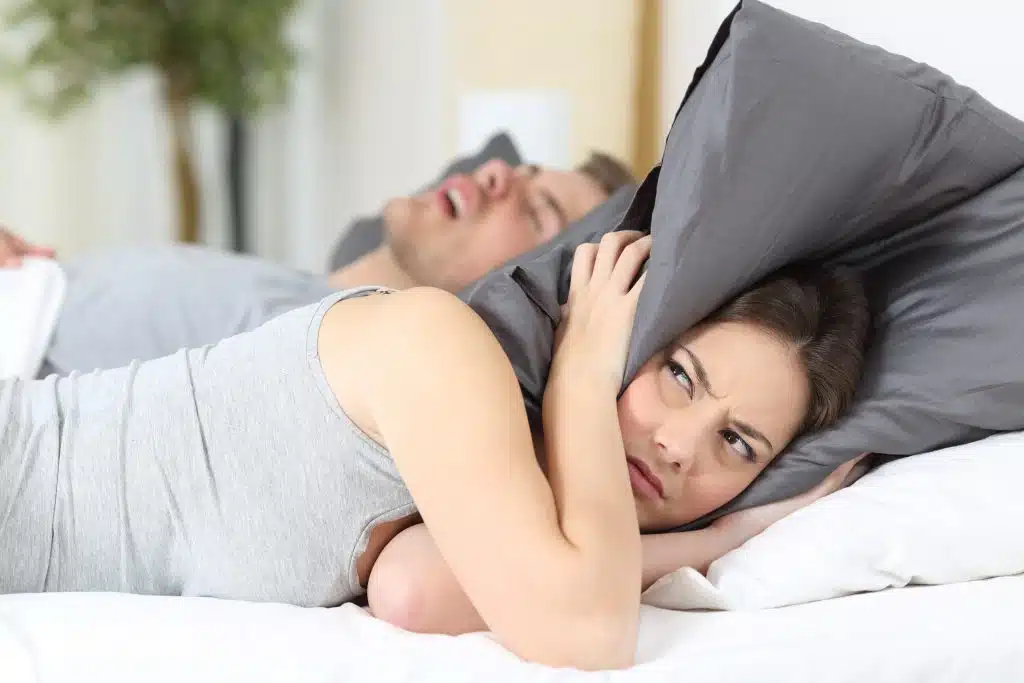Have you ever wondered, “why do people snore while they’re sleeping?” Snoring can be off-and-on depending on the person, or it might be a nightly occurrence. If you’re considering snoring treatment in San Diego, the first step is to figure out the causes of snoring loud and what you can do to manage them.
Why do People Snore While Sleeping?
Snoring is the noise we hear when soft tissues vibrate against each other in the back of our throats. As air flows between them, the soft tissue flaps back and forth against other tissues, making the snoring noise. These tissues can include your tongue, tonsils, soft palate (the furthest back portion of the roof of your mouth,) and uvula (the uvula is the thin strip of skin that hangs down the middle of the back of your throat.)
Medication or Alcohol Consumption
If you drink alcohol in the evening before going to bed or take certain types of medications that act as central nervous system depressants, your body’s muscles will be in a more relaxed state once you fall asleep. This can lead to sagging tissues in areas where muscles typically stay taut. You might find that if you have a nightcap or take Nyquil, you’re snoring more than you usually do. If you do decide to have a drink now and then, it’s best to enjoy it at least a few hours before your head hits the pillow.
Weight Gain
One of the biggest risk factors for sleeping disorders and snoring is a large neck circumference. This can be brought on by an enlargement in neck and oral tissues due to weight gain. If you’ve found that your BMI has increased because of lifestyle issues, diet, or medications that you’re taking, the wider circumference around your neck may be what’s causing you to snore at night.
Sinus Congestion
Sinus infections, chronic congestion, and seasonal allergies can cause some people to snore at night. When you can’t breathe through your nose due to congestion, or the airway is limited because of swelling, you’ll have a harder time getting air into your lungs. Some people also switch to mouth breathing whenever they’re congested. When you mouth breathe, the air is flowing over your tongue and between your tonsils and soft palate, creating the perfect storm for snoring to occur.
Enlarged Tonsils
Do you have fairly large tonsils? Just like weight gain or sinus obstruction, your swollen tonsils can get in the way of your breathing. If your soft palate and tonsils are touching each other too much because of the swelling, there’s a good chance that you’ll hear some snoring as well. This is why snoring typically improves once someone has their chronically-inflamed tonsils removed.
Sleep Apnea
Sleeping disorders such as obstructive sleep apnea (OSA) may be one of the causes of snoring loud. But there’s an important thing to remember: not everyone with sleep apnea snores and not everyone who snores has sleep apnea.
Obstructive sleep apnea is caused by a collapse of soft tissues in the back of your throat and upper airway. As such, it can sometimes be why people snore while sleeping. But it’s more dangerous than that; people with OSA are at a greater risk of heart attack, stroke, and other long-term health effects of snoring and sleep-disordered breathing.
San Diego Sleep & TMJ Center can help people with obstructive sleep apnea manage their disorder with a special type of oral appliance. These sleep mouthguards open the upper airway by positioning the lower jaw in a slightly forward manner, reducing airway restriction.
Snoring Treatment in San Diego
If you or your partner struggles with constant snoring, San Diego Sleep & TMJ Center can help. We’ll evaluate your oral anatomy and even order a home sleep study if needed to figure out why someone snores. Depending on your circumstances, we may recommend some lifestyle changes or wearing an oral sleep appliance.
Call our San Diego sleep dentistry office today to learn how you can get a better night’s rest.


